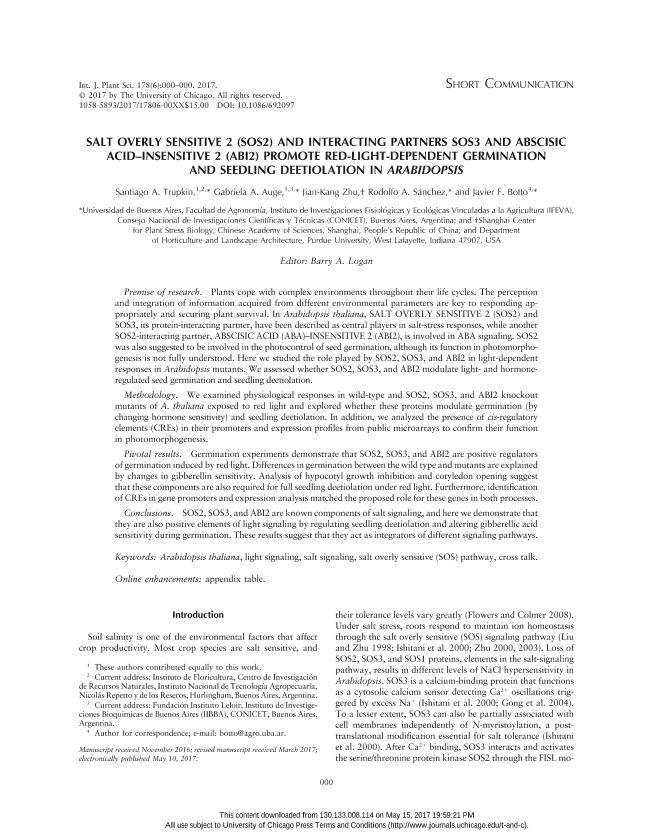Artículo
SALT OVERLY SENSITIVE 2 (SOS2) and Interacting Partners SOS3 and ABSCISIC ACID–INSENSITIVE 2 (ABI2) Promote Red-Light-Dependent Germination and Seedling Deetiolation in Arabidopsis
Trupkin, Santiago Ariel ; Auge, Gabriela Alejandra
; Auge, Gabriela Alejandra ; Zhu, Jian-Kang; Sanchez, Rodolfo Augusto
; Zhu, Jian-Kang; Sanchez, Rodolfo Augusto ; Botto, Javier Francisco
; Botto, Javier Francisco
 ; Auge, Gabriela Alejandra
; Auge, Gabriela Alejandra ; Zhu, Jian-Kang; Sanchez, Rodolfo Augusto
; Zhu, Jian-Kang; Sanchez, Rodolfo Augusto ; Botto, Javier Francisco
; Botto, Javier Francisco
Fecha de publicación:
05/2017
Editorial:
University of Chicago Press
Revista:
International Journal of Plant Sciences
ISSN:
1058-5893
e-ISSN:
1058-5893
Idioma:
Inglés
Tipo de recurso:
Artículo publicado
Clasificación temática:
Resumen
Premise of research. Plants cope with complex environments throughout their life cycles. The perception and integration of information acquired from different environmental parameters are key to responding appropriately and securing plant survival. In Arabidopsis thaliana, SALT OVERLY SENSITIVE 2 (SOS2) and SOS3, its protein-interacting partner, have been described as central players in salt-stress responses, while another SOS2-interacting partner, ABSCISIC ACID (ABA)–INSENSITIVE 2 (ABI2), is involved in ABA signaling. SOS2 was also suggested to be involved in the photocontrol of seed germination, although its function in photomorphogenesis is not fully understood. Here we studied the role played by SOS2, SOS3, and ABI2 in light-dependent responses in Arabidopsis mutants. We assessed whether SOS2, SOS3, and ABI2 modulate light- and hormone-regulated seed germination and seedling deetiolation. Methodology. We examined physiological responses in wild-type and SOS2, SOS3, and ABI2 knockout mutants of A. thaliana exposed to red light and explored whether these proteins modulate germination (by changing hormone sensitivity) and seedling deetiolation. In addition, we analyzed the presence of cis-regulatory elements (CREs) in their promoters and expression profiles from public microarrays to confirm their function in photomorphogenesis. Pivotal results. Germination experiments demonstrate that SOS2, SOS3, and ABI2 are positive regulators of germination induced by red light. Differences in germination between the wild type and mutants are explained by changes in gibberellin sensitivity. Analysis of hypocotyl growth inhibition and cotyledon opening suggest that these components are also required for full seedling deetiolation under red light. Furthermore, identification of CREs in gene promoters and expression analysis matched the proposed role for these genes in both processes. Conclusions. SOS2, SOS3, and ABI2 are known components of salt signaling, and here we demonstrate that they are also positive elements of light signaling by regulating seedling deetiolation and altering gibberellic acid sensitivity during germination. These results suggest that they act as integrators of different signaling pathways.
Archivos asociados
Licencia
Identificadores
Colecciones
Articulos(IIBBA)
Articulos de INST.DE INVEST.BIOQUIMICAS DE BS.AS(I)
Articulos de INST.DE INVEST.BIOQUIMICAS DE BS.AS(I)
Citación
Trupkin, Santiago Ariel; Auge, Gabriela Alejandra; Zhu, Jian-Kang; Sanchez, Rodolfo Augusto; Botto, Javier Francisco; SALT OVERLY SENSITIVE 2 (SOS2) and Interacting Partners SOS3 and ABSCISIC ACID–INSENSITIVE 2 (ABI2) Promote Red-Light-Dependent Germination and Seedling Deetiolation in Arabidopsis; University of Chicago Press; International Journal of Plant Sciences; 178; 6; 5-2017; 485-493
Compartir
Altmétricas



